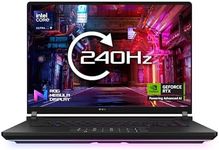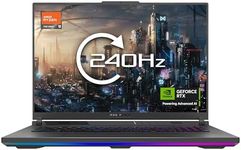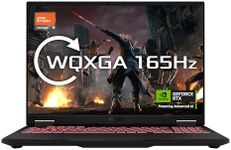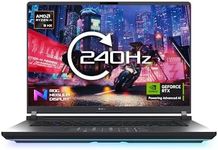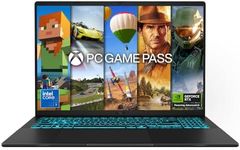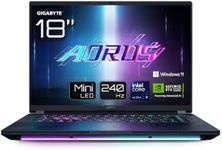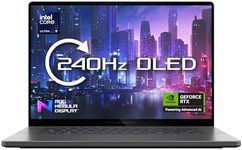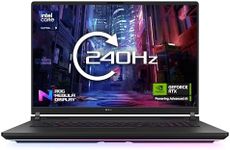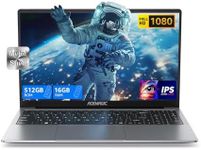Buying Guide for the Best Gaming Laptops
Choosing the right gaming laptop can be a daunting task, but with the right approach, you can find a model that fits your needs perfectly. The key is to understand the specifications that matter most for gaming and how they align with your gaming habits and preferences. By focusing on the right specs, you can ensure that your gaming laptop delivers the performance, graphics, and overall experience you desire.Processor (CPU)The processor, or CPU, is the brain of your gaming laptop. It handles all the instructions from your games and other applications. A powerful CPU ensures smooth gameplay and quick load times. CPUs are typically divided into entry-level, mid-range, and high-end. Entry-level CPUs are suitable for casual gaming and less demanding games. Mid-range CPUs offer a good balance for most gamers, handling popular titles with ease. High-end CPUs are for serious gamers who play the latest AAA games at high settings. Choose a CPU based on the types of games you play and how demanding they are.
Graphics Card (GPU)The graphics card, or GPU, is crucial for rendering the visuals in your games. A powerful GPU ensures high frame rates and better graphics quality. GPUs are categorized into entry-level, mid-range, and high-end. Entry-level GPUs can handle older or less demanding games. Mid-range GPUs are suitable for most modern games at medium to high settings. High-end GPUs are for gamers who want to play the latest games at the highest settings with features like ray tracing. Consider the games you play and the graphics quality you desire when choosing a GPU.
RAMRAM, or Random Access Memory, is where your laptop stores data that is actively being used or processed. More RAM allows for better multitasking and smoother performance in games. Gaming laptops typically come with 8GB, 16GB, or 32GB of RAM. 8GB is the minimum for gaming, suitable for less demanding games. 16GB is the sweet spot for most gamers, providing enough memory for modern games and multitasking. 32GB is for heavy multitaskers and those who use their laptop for more than just gaming, such as video editing. Choose the amount of RAM based on your gaming and multitasking needs.
StorageStorage determines how much space you have for games, applications, and files. There are two main types: HDD (Hard Disk Drive) and SSD (Solid State Drive). SSDs are faster and more reliable but more expensive, while HDDs offer more storage for less money. Many gaming laptops come with a combination of both. An SSD is recommended for your operating system and games for faster load times, while an HDD can be used for additional storage. Consider how many games and files you need to store and choose a storage configuration that fits your needs.
DisplayThe display is where you see your games, so it's important for an immersive experience. Key factors include resolution, refresh rate, and size. Resolution affects the clarity of the image, with Full HD (1080p) being standard, while 1440p and 4K offer higher clarity. Refresh rate, measured in Hz, affects how smooth the motion appears, with 60Hz being standard, and 120Hz or 144Hz providing smoother gameplay. Size is a personal preference, with 15-inch and 17-inch being common for gaming laptops. Choose a display based on your preference for clarity, smoothness, and portability.
Battery LifeBattery life determines how long you can game on the go without needing to plug in. Gaming laptops are generally power-hungry, so battery life can vary significantly. High-performance components like powerful CPUs and GPUs consume more power. If you plan to game mostly while plugged in, battery life may be less of a concern. However, if you need portability and plan to game away from a power source, look for a laptop with longer battery life. Keep in mind that gaming on battery power may reduce performance to conserve energy.
Cooling SystemThe cooling system is essential for maintaining performance and preventing overheating during long gaming sessions. A good cooling system includes multiple fans and heat pipes to dissipate heat effectively. Poor cooling can lead to thermal throttling, where the CPU and GPU reduce performance to avoid overheating. Look for laptops with advanced cooling solutions if you plan to game for extended periods. Consider the cooling system's effectiveness and noise level, as some systems can be quite loud. A well-cooled laptop ensures consistent performance and longevity.
Keyboard and Build QualityThe keyboard and build quality affect your overall gaming experience and the laptop's durability. A good gaming keyboard should have responsive keys, customizable RGB lighting, and features like anti-ghosting and N-key rollover for accurate key presses. Build quality refers to the materials and construction of the laptop, impacting its durability and feel. Metal chassis are more durable than plastic ones. Consider how comfortable the keyboard feels for long gaming sessions and the overall sturdiness of the laptop. A well-built laptop with a good keyboard enhances your gaming experience.
